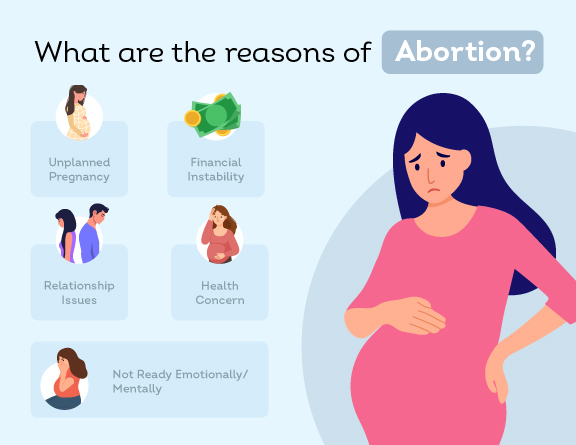
Select City
A woman may suffer from an inevitable abortion due to several reasons starting from health complications to lifestyle habits. The condition requires immediate medical intervention from a gynecologist. Get in touch with Pristyn Care and consult the best gynecologist for inevitable abortion treatment.
A woman may suffer from an inevitable abortion due to several reasons starting ... Read More




Free Consultation

Free Cab Facility

No-Cost EMI

Support in Insurance Claim

1-day Hospitalization

USFDA-Approved Procedure
Choose Your City
It help us to find the best doctors near you.
Bangalore
Chennai
Coimbatore
Delhi
Hyderabad
Kolkata
Madurai
Mumbai
Pune
Thiruvananthapuram
Delhi
Gurgaon
Noida
Ahmedabad
Bangalore

Unmarried/Single Allowed

Affordable and Inclusive

Experienced Lady Doctor

Expertise 12-24 Weeks

No Partner/Spouse Consent

Highly Confidential
| Do's | Don'ts |
|---|---|
| Ultrasound is essential before Abortion | Never take medical pills from chemist |
| Blood Tests are necessary before Abortion | Never test home remedies |
| Check Govt. Registration Certificate of the Center | Never visit unregistered/unapproved center |
| Consult Gynaecologist before abortion procedure | Don't go to quacks or unqualified person |
What is Inevitable Abortion?
‘Inevitable abortion’ is another term for ‘pregnancy loss’ or ‘miscarriage.’ The term is used to describe a situation where a miscarriage or pregnancy loss cannot be avoided. It refers to the spontaneous loss of a pregnancy before the 20th week of gestation. The condition is often marked by vaginal bleeding, unusual abdominal cramping, and the passing of tissue from the uterus.
Inevitable abortion indicates that the pregnancy cannot be continued or sustained. Medical intervention is often crucial to manage or treat unavoidable pregnancy loss. It’s essential for individuals experiencing signs of an inevitable abortion to consult a gynecologist promptly for evaluation and appropriate management.
What Causes Inevitable Abortion?
Inevitable abortion causes may include the following:


Chromosomal abnormalities in the fetus – Chromosomal abnormalities in the fetus, such as errors in genes, can lead to inevitable abortion. Chromosomal abnormalities account for almost 50% of inevitable abortions in the first trimester of pregnancy.
Structural abnormalities of the uterus or cervix – Structural abnormalities of the uterus such as uterine septum or cervical incompetence can increase the risk of inevitable abortion. In this condition, the uterus is not capable to support the development of the fetus.
Age – Women over 35 years of age are at a greater risk of inevitable abortions. As a woman ages, the chances of chromosomal abnormalities in eggs increase, Advanced maternal age, typically defined as over 35 years, impacts the viability of the pregnancy.
Trauma or injury to the abdomen – Trauma or injury to the abdomen can lead to detachment of the placenta, uterine rupture, or direct harm to the developing fetus, increasing the risk of inevitable abortion.
Autoimmune disorders or blood clotting disorders – Autoimmune disorders or blood clotting disorders can lead to inevitable abortion by causing abnormalities in the immune response or blood clotting mechanisms.
Lifestyle factors – Lifestyle factors such as smoking, drug use, excessive alcohol consumption, and poor nutrition can negatively impact fetal development, interfere with placental function, and disrupt hormonal balance, leading to inevitable abortion.
Signs of Inevitable Abortion
Inevitable abortions mostly occur during the first trimester of pregnancy. Common signs of inevitable abortions may include:
Treatment Options for Inevitable Abortions
There are primarily three approaches to treating an inevitable abortion:
Expectant Management – In the simplest terms, this approach means ‘wait and see what happens.’ Expectant management involves waiting for 7-14 days allowing the pregnancy for medical intervention. Almost 50 percent of women resort to an expectant management approach for inevitable abortion. This method is mostly recommended in the first trimester of pregnancy.
Medications – Medication for inevitable abortion typically includes the use of a misoprostol tablet, which helps to induce uterine contractions and expel the contents of the uterus. Misoprostol, also known as the ‘abortion pill’ is often administered orally or vaginally. The tablet should only be taken under the supervision of a healthcare provider to ensure safety and effectiveness.
Surgery – Surgical treatment for inevitable abortion includes dilation and curettage (D&C) and dilation & evacuation (D&E). In D&C, the cervix is dilated and the fetal tissue are removed from the uterus. D&E or vacuum aspiration is a safe and quick treatment that involves using a small suction tube to gently remove tissue from inside the uterus.
Which is the Best Treatment For Inevitable Abortion?
While multiple approaches exist for managing inevitable abortion, including medications, expectant management, and surgery, surgery is often the most effective option. Medications such as misoprostol can help induce contractions and expel the fetus content from the uterus. However, medications may not always be successful and can lead to prolonged bleeding or incomplete abortion. In that case, surgery might be required to clean the remaining contents of the uterus. Expectant management can prolong physical and emotional distress. In contrast, surgical approaches such as dilation and curettage (D&C) provide a quicker and more reliable resolution by effectively removing the pregnancy tissue. This minimizes the risk of complications and ensures comprehensive management of the condition. Hence, most healthcare providers consider surgery as the best treatment for inevitable abortion, for it provides a prompt solution to patients looking to treat inevitable abortion.
Diagnosis Before Inevitable Abortion Surgery
Your healthcare team might do a variety of tests to diagnose inevitable abortion or miscarriage:
Blood tests – Blood tests are done to check the level of pregnancy hormone, called human chorionic gonadotropin (hCG). A low or falling level of hCG could indicate a pregnancy loss. If the pattern of changes in your hCG level is irregular, your healthcare professional may recommend more blood tests or an ultrasound.
Pelvic exam – A pelvic exam is done to check if the lower end of the uterus has begun to open. An open cervix is often an indicator of inevitable abortion.
Ultrasound – The gynecologist, with an ultrasound, checks for the fetal heartbeat and evaluates if the fetus is growing. If the result indicates no growth of the fetus, it most likely is a sign of an inevitable abortion.
Based on the findings of the tests, the healthcare provider analyzes what might have caused the inevitable abortion and determines the best treatment for the same.
Risks and Complications in Inevitable Abortion Surgery
Although complications after inevitable abortion treatment through D&C are not very serious, they are not unheard of. Commonly noted complications include:
Is Inevitable Abortion and Incomplete Abortion Same?
No, inevitable abortion and incomplete abortion are not the same. While both are related to pregnancy loss, there is a thin lining of difference between inevitable abortion and incomplete abortion. Inevitable abortion is a situation where the miscarriage or the pregnancy loss cannot be prevented. Inevitable abortion occurs due to factors such as vaginal bleeding and cervical dilation. It is a condition in which the abortion has occurred but the products of conception have not yet been expelled from the uterus.
Incomplete abortion, on the other hand, occurs when some of the products of conception have been expelled from the uterus, but some remain inside. An incomplete abortion involves vaginal bleeding, cramping (contractions), cervical dilatation, and incomplete passage of the products of conception. Patients experiencing incomplete abortion frequently describe the passage of clots or pieces of tissue and report vaginal bleeding.
Cost of Inevitable Abortion Treatment
The cost of medicines for inevitable abortion costs may be anywhere from Rs. 10,000 to Rs. 15,000.
The cost of D&C surgery for inevitable abortion costs may range from Rs. 30,000 to Rs. 45,000.
The cost of the treatment may differ based on multiple factors including:

Fill details to get actual cost
Ask your doctor the following questions and anything else that you deem important to get complete clarity about the treatment of inevitable abortion.
Yes, you can get pregnant after an inevitable abortion. At least 80% of women who have had an abortion have normal pregnancies and births. Having an inevitable abortion doesn’t indicate a fertility problem that may hinder your pregnancy plans.
If you are looking for inevitable abortion treatment, you should consult with a trained and experienced gynecologist. A gynecologist or an OB-Gyne is certified to treat abortion through different approaches and can also guide you to a healthy and safe pregnancy journey. Contact Pristyn Care, if you have suffered a miscarriage, pregnancy loss, or an inevitable abortion, and consult with the best gynecologist.
Although there is no sure shot way to prevent an inevitable abortion, there are ways that can help you cut down the chances of it. Here are a few tips to help you.
ASMA
Recommends
Way of Suggestions for the treatment is really good
Rupanjali Tendulkar
Recommends
Pristyn Care delivers extraordinary services during my surgical abortion. Doctors were professional and compassionate. Everything was nice. You must choose Pristyn Care if you are looking for a healthcare center to get effective and safe treatment at an affordable price. Highly recommended!
Yashoda Nag
Recommends
Pristyn Care provided excellent care and support during my abortion. The doctors were understanding and caring, ensuring a comfortable and safe procedure. Pristyn Care's team guided me through the process and provided the necessary information. Thanks to Pristyn Care, I had a positive experience, and I appreciate their kindness and professionalism.
Sunidhi Prajapati
Recommends
When faced with an unexpected pregnancy, I turned to Pristyn Care for abortion, and they exceeded my expectations in every way. The medical team was incredibly supportive and non-judgmental, providing me with all the necessary information and counseling. The medical abortion procedure was safe and discreet, and the follow-up care was excellent. Pristyn Care's compassionate approach made an emotionally challenging time easier to navigate. I am grateful to Pristyn Care for their expert abortion medical services and highly recommend them to anyone in need of sensitive and professional care.
Manjari Nagar
Recommends
Pristyn Care team was professional throughout the abortion procedure. The care coordinators keep me in the loop at each step. As it is a very emotional time for me, the doctors and nurses made me feel comfortable. I am thankful to the entire team of Pristyn Care. Thank you!
Avanti Dwivedi
Recommends
My experience with Pristyn Care was exceptional. They provided comprehensive care in a safe and comfortable environment. The facility followed all safety protocols, and the medical team was well-trained and supportive. They took the time to listen to my concerns and address them with care. Pristyn Care made a challenging situation more manageable, and I'm grateful for their dedication to patient well-being.
.svg)
.svg)